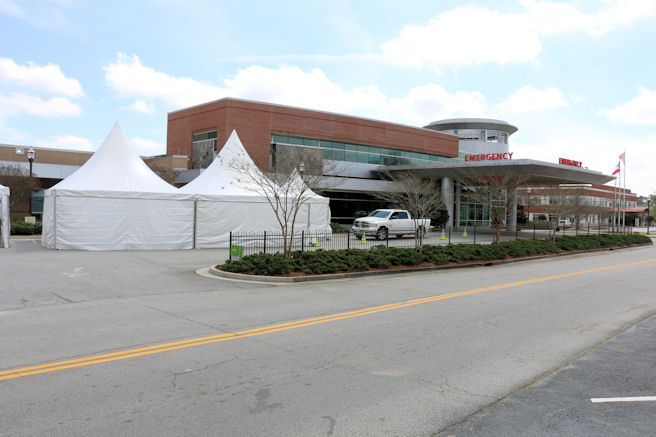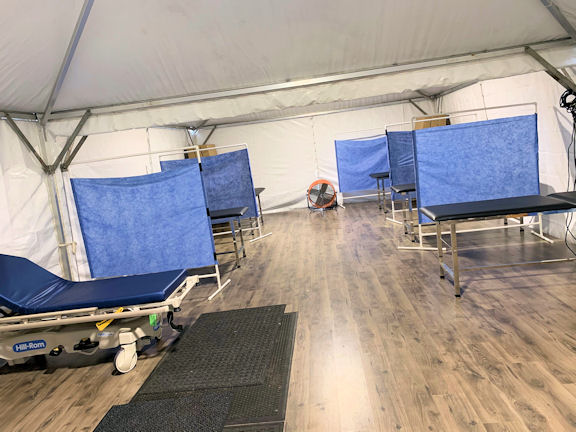Unprecedented times have required unprecedented changes in a host of industries. And as the COVID-19 pandemic rolls on across the country, the nation’s health systems, too, are being called on to adapt in new ways.
At Tanner Health System, the organization is relying on its pandemic plans — while monitoring and adjusting to the evolving realities along the way.
The health system was among the first in Georgia
to encourage residents to shelter at home to stop the spread of the virus, search out effective ways to stretch personal protective equipment (PPE) and offer
innovative ways to extend services to people — even while encouraging residents to continue maintaining social distance to stay healthy.
Tanner also worked to aggressively expand access to testing, ensuring the health system had the data to know when the community could most safely return to normal.
“We recognized rather early how quickly this virus could overwhelm our resources,” said Laura Larson, MD, a board-certified infectious disease specialist who serves as medical director of infection prevention for Tanner. “We used the data we had, ran the models and saw what could happen. And we actively worked with other physicians, our leadership and our community to limit the spread so we could care for as many people as possible.”
Facilities Made to Adapt
One of the most concrete changes the health system has made is in its physical hospitals themselves.
The health system is relying on its larger hospital facilities in Carrollton and Villa Rica to provide care for almost all COVID-19 patients. Not only do these hospitals offer greater access to the medical specialists that COVID-19 patients often need — like intensive care physicians, nephrologists, pulmonologists and cardiologists — but both facilities are built to adapt to an infectious disease pandemic.
“One of our advantages in being a hospital system is that we’re able to utilize different hospitals to separate patients to ensure their safety,” said Benjamin Camp, MD, senior vice president and chief medical officer for Tanner. “It’s given us the capacity to cohort COVID-19 patients at some facilities while leaving others safe from the virus.”
Entire wings at Tanner Medical Center/Carrollton — including rooms in the emergency department and entire wings of a hospital addition built in 1976 — can be converted to negative pressure, ensuring that airborne viruses don’t spread to other parts of the hospital. So far, the hospital has converted two of those wings to care for COVID-19 patients. It’s also using its relatively new 12-bed intensive care unit (ICU) to care for its most acute patients.
Tanner Medical Center/Villa Rica, which opened its hospital facility in 2003, was also designed to be flexible to care for an influx of acutely ill patients. The hospital also features several isolation and negative pressure rooms in its new emergency department — part of a 2018 hospital expansion — to care for patients with confirmed or suspected COVID-19 infections.
In all facilities, environmental services staff have stepped up cleaning protocols to keep the hospitals safe and sanitized.
As of April 15, Tanner Medical Center/Carrollton is caring for 22 confirmed COVID-19 patients, and Tanner Medical Center/Villa Rica is caring for seven. So far, more than 60 COVID-19 patients have been discharged from Tanner facilities.
The health system has designated two of its facilities — Higgins General Hospital in Bremen and Tanner Medical Center/East Alabama, both critical access hospitals — as receiving facilities for the non-COVID-19 patients and overflow as necessary.
Expanding COVID-19 Testing
 Tanner has used guidance from its medical staff to realize the need for greater access to COVID-19 testing. The results of that testing will help inform the health system when it can return to normal operations.
Tanner has used guidance from its medical staff to realize the need for greater access to COVID-19 testing. The results of that testing will help inform the health system when it can return to normal operations.
Tanner began early with drive-up testing on its Carrollton campus, expanding to an acute care clinic that offers testing and monitoring with physician orders. The health system also invested early to ensure a ready supply of tests.
While on-demand testing isn’t available, Tanner continues to ensure access to COVID-19 tests for those who need it.
“We’ve been among the leaders in the state in testing, and that’s given us the data we need to monitor the virus’ spread,” said Loy Howard, president and CEO for Tanner. “Our medical staff was adamant, very early on, that testing would be vital to ensuring we had the resources ready to respond to this pandemic.”
Expanding access to testing has already allowed the health system to offer more than 2,100 COVID-19 tests, with just more than 300 returning positive. About 15% of the tests resulted have returned positive for the virus.
The health system now offers telehealth visits with Tanner Medical Group providers who can assess if callers need COVID-19 testing. Callers can inquire about COVID-19 testing at 770-812-9057.
Keeping Staff Safe With PPE
Gowns, face shields, gloves and masks are in short supply across the country. But at Tanner, pandemic plans, innovation and community response have helped to ensure the safety of healthcare staff.
Tanner maintained a ready supply of PPE as part of its pandemic plans. It’s also reached out to local manufacturers and volunteers to supply reusable gowns, face shields, mask coverings and other protective equipment.
The health system has pressed into use its germ-killing robots to help it sanitize masks to extend their longevity as well.
“We can’t care for our community if we’re sick, too,” said Dr. Larson. “That’s why we’ve sought out the latest research and made these contacts with community suppliers to keep our staff safe, well and able to care for patients.”
Expanding Telehealth
Tanner Medical Group, one of metro Atlanta’s largest multi-specialty physician groups,
is expanding its telehealth capabilities.
In March, Tanner Medical Group began offering telehealth visits with its providers to help people determine if they should be tested for COVID-19.
Now, the organization is expanding access for a host of general wellness services.
People can schedule a telehealth appointment with a Tanner Medical Group provider — including physicians and advanced practice providers, like physician assistants and nurse practitioners — by calling a Tanner Medical Group practice. A full list of practices can be found at TannerMedicalGroup.org.
Tanner Medical Group also continues to offer in-person appointments as needed, with protocols in place to ensure the safety of patients.
“We realize this pandemic has taken an incredible toll on our entire medical staff,” said Howard. “We’re grateful for their leadership, their expertise and their commitment to helping to guide us through this pandemic. Many of them have reduced their hours and canceled elective procedures to ensure the safety of their patients, and we’re grateful for their response.”
Walk-in Care at Tanner Urgent Care
The
Tanner Urgent Care centers in Carrollton and Villa Rica are offering walk-in care for people with minor medical emergencies, including COVID-19 concerns.
The health system temporarily closed the Tanner Urgent Care location in Bremen at the beginning of the outbreak to reallocate staff and resources to its busier locations in Carrollton and Villa Rica. The sites offer occupational health services — including evaluating regional workers and issuing letters that allow essential staff to return to work if employers are concerned about COVID-19 symptoms or exposure.
Those who think they may be experiencing COVID-19 symptoms — including a fever, cough and shortness of breath — are encouraged to call ahead at 770-812-9445 so staff can prepare for their arrival.
Wait times and addresses for Tanner Urgent Care can be found at TannerUrgentCare.org.
Care for Mind and Body
Willowbrooke at Tanner, the 92-bed inpatient behavioral health facility in Villa Rica, is not admitting suspected COVID-19 patients. Staff is taking measures to ensure patients there remain safe, including wearing masks and practicing rigorous hand hygiene.
Many behavioral health services — including its partial hospitalization program — have moved to telehealth. Clients can call in or patch in with secure software to attend therapy sessions.
Willowbrooke at Tanner has also launched a COVID-19 Stress Line to specifically offer telehealth services for people dealing with anxiety, depression and other mental health issues related to the COVID-19 pandemic.
Those interested can schedule an appointment with a behavioral health clinician by calling 770-812-3266. More information is available at tanner.org/WBstressline.
Tanner has expanded online access to educational services for people with chronic health conditions, like diabetes during the pandemic.
Other Changes
The health system is adapting in other ways, too.
While the units caring for COVID-19 patients are fully staffed with clinicians, other parts of the health system have limited access to decrease exposure to COVID-19 among patients and visitors.
This has left those parts of the organization largely idled, including elective surgical procedures and diagnostic imaging services, resulting in many employees with little work to do.
Tanner has reallocated employees whenever possible to areas that need additional staffing. It’s also operating an active labor pool to ensure eligible staff receive as many hours as possible.
The health system is using relief packages offered by state and federal governments to make sure that employees are helped even during furlough. Tanner is also continuing health benefits for furloughed staff and applying for any other assistance that can be offered by governments and nonprofit organizations.
Tanner is also working to find more ways to reduce costs while continuing its vital mission as a community healthcare organization.
“It’s important that we have viable community hospitals — both now and into the future,” said Benjamin Camp, MD, senior vice president and chief medical officer for Tanner. “The importance of having community hospitals like ours has never been more apparent.”
The Two Crises
The adage says, “this, too, shall pass.”
As a community healthcare organization, Tanner is committed to being ready to provide for the health needs of the community after the pandemic passes.
“We’re eager to return to normal operations,” said Howard. “We’re looking at what our organization is going to look like on the other side of this pandemic. We’ve built a health system that’s designed to care for this community — and our community’s needs persist.”
It’s also working to ensure its financial viability into the future.
According to Howard, Tanner is ready to ramp up operations — but only when it’s safe to do so. And the data the health system is gaining from its expanded testing capabilities are informing that decision.
“The most important thing right now is to continue limiting the spread of the virus,” said Howard. “That’s how we ensure we have the resources we need to care for our neighbors during the pandemic. It’s also how we ensure that our hospitals will still be available afterward.”
In the meantime, many hospital services are continuing. Precautions are in place in the health system’s four regional emergency departments to ensure the safety of non-COVID-19 patients experiencing medical emergencies or trauma, physician offices have adopted telehealth and other strategies to continue serving patients, and in many other ways residents continue to receive access to the medical care to which they’re accustomed.
Howard reaffirmed his gratitude for everyone and their commitment to community health care.
“I’m extremely proud of how our organization has risen to this challenge,” said Howard. “Community hospitals care for communities. That’s what we do. Our business has been severely disrupted and we’re facing an unprecedented need to respond to the pandemic. We are adjusting to a new and different reality, but we’re adjusting well. I’m confident in our organization and in the team that keeps us ready to fulfill our mission to serve our communities.”
More information on Tanner’s COVID-19 response is available online at
tanner.org/ncov.